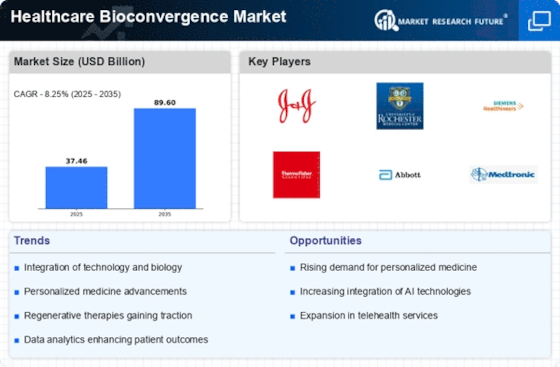Market Analysis
In-depth Analysis of Healthcare Bioconvergence Market Industry Landscape
A multitude of factors collectively shape dynamics within the rapidly changing landscape of healthcare and biotechnology, thus affecting The Healthcare Bioconvergence Market. Primarily, this market is driven by increasing integration among various technologies, disciplines, or data sources within the health industry. Advancements in medical research and technology, therefore, play crucial roles in shaping healthcare bioconvergence markets. Ongoing research efforts focus on integrating biological data along with clinical data, including genomic information with cutting-edge technologies such as artificial intelligence (AI) robotics, plus wearable devices like fitness trackers, et cetera. Innovations in bioinformatics and data analytics contribute to personalized treatments, predictive diagnostics, and improved healthcare delivery systems, among other things, subsequently influencing the market landscape. Regulatory considerations are critical factors in developing and implementing bioconvergence solutions in healthcare. Patient data protection, advanced technology standards, and integrated health system ethics are maintained through stringent regulatory requirements. Economic conditions play a significant role in the healthcare bioconvergence market. Research, development, and adoption of bioconvergence technologies within healthcare systems have been driven by economic growth and stability. On the contrary, economic constraints may influence healthcare budgets as well as the speed of uptake for innovative bioconvergence solutions. Furthermore, economic aspects shape cost-effective, scalable bioconvergent applications that could work across various healthcare settings. Key market dynamics also include competition among technology providers, biotech companies, and healthcare institutions, including startups. The high competition environment encourages innovation, with firms trying to develop and offer better care paths to patients, which results from the advancement of converging technologies. This means that consumer preferences, especially with respect to health workers' preferences, patients' choices, and administrators' choices, determine what will happen on the ground concerning healthcare convergence. For example, healthcare providers may prefer integrated platforms that improve clinical decision-making processes while reducing administrative burdens and enhancing patient care at large-scale levels. Healthcare policy frameworks, besides reimbursement measures, do influence massively upon this aspect regarding the nature of the industry itself; therefore, regulatory policies need to be aligned with technological integration in addition to interoperability within health systems alongside the appropriate practice of sharing data so as to introduce such approaches related to convergence into everyday operations successfully. Reimbursement models may subsequently drive the adoption of bioconvergence solutions by emphasizing value-based care enhanced patient outcomes plus cost-effectiveness as an alternative finding solution.


















Leave a Comment